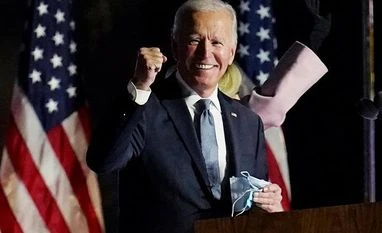President Joe Biden on Wednesday will call for a dramatic and permanent shift in the direction of the US economy with a roughly $2 trillion package to invest in traditional projects like roads and bridges alongside tackling climate change and boosting human services like elder care.
He also aims to put corporate America on the hook for the tab, which is expected to grow to a combined $4 trillion once he rolls out the second part of his economic plan in April.
Coupled with his recently enacted $1.9 trillion coronavirus relief package, Biden's infrastructure initiative would give the federal government a bigger role in the US economy than it has had in generations, accounting for 20% or more of annual output.
The effort, to be announced on Wednesday at an event in Pittsburgh, sets the stage for the next partisan clash in Congress where members largely agree that capital investments are needed but are divided on the total size and inclusion of programs traditionally seen as social services. How to pay for them will be a fractious issue in its own right.
Biden is ignoring a campaign promise to raise taxes on wealthy individuals, at least for now, with none of the expected increases in the top marginal rate or capital gains tax.
The plan would instead increase the corporate tax rate to 28% from 21% and change the tax code to close loopholes that allow companies to move profits overseas, according to a 25-page briefing paper released by the White House.
The plan would spread the cost for projects over an eight-year period and aims to pay for it all over 15 years, a senior administration official said.
Neil Bradley, executive vice president and chief policy officer at the nation's largest trade group, the US Chamber of Commerce, said while the organization shares Biden's sense of urgency on infrastructure, his plan is "dangerously misguided."
"We strongly oppose the general tax increases proposed by the administration which will slow the economic recovery and make the U.S. less competitive globally – the exact opposite of the goals of the infrastructure plan," Bradley said.
The plan includes $621 billion to rebuild infrastructure, such as roads, bridges, highways and ports, and a historic $174 billion investment in the electric vehicle market that sets a goal of a nationwide charging network by 2030.
In many cases, the White House cast those goals in the language of addressing economic inequities born of historic racial discrimination, such as spending on interstate highway developments that split communities of color or air pollution that affects Black and Hispanic communities near ports or power plants.
Congress will also be asked to put $400 billion toward expanding access to affordable home or community-based care for aging Americans and people with disabilities. It's aimed at "underpaid and undervalued workers in that industry, who are disproportionately women of color.
There is $213 billion provided to build and retrofit affordable and sustainable homes along with hundreds of billions to support US manufacturing, bolster the nation’s electric grid, enact nationwide high-speed broadband and revamp the nation’s water systems to ensure clean drinking water.
SECOND LEGISLATIVE PACKAGE COMING
Biden is moving forward with the massive job and infrastructure effort as he navigates an ambitious timeline to provide enough COVID vaccines for all adults by the end of May and the deployment of pandemic relief.
The White House is also dealing with a rise in the number of migrants at the southern border, the fallout from back-to-back mass shootings and a looming showdown over the Senate filibuster.
That package is expected to include an expansion in health insurance coverage, an extension of the expanded child tax benefit, and paid family and medical leave, among other efforts aimed at families.
House of Representatives Speaker Nancy Pelosi has signaled that she hopes to pass the infrastructure plan by July 4, though that timeline could easily slip as Democrats race to write the legislation and agree on details.
The jockeying has already begun, as allies push for inclusion of their priorities and Republicans signal early concerns about the package's size and scope.
Moderate Democrats have said the package should be more targeted to traditional infrastructure projects to attract Republican votes, seeking a return to bipartisan policymaking.
Liberal lawmakers want to use the party's slim majorities in Congress to tackle some of the nation’s biggest problems, such as climate change and economic inequality, with resources that reflect the size of those challenges.
Representative Pramila Jayapal, a leading progressive Democrat, said on Tuesday that outside groups like Americans for Tax Fairness pegged the infrastructure and jobs plan that Biden rolled out on the campaign trail at between $6.5 trillion and $11 trillion over 10 years.
"We'd like to see a plan that goes big," Jayapal said. "We really think that there's ample room to get the overall number up to somewhere in that range in order to really tackle the scale of investments that we need to make." Republican Senator Mitch McConnell of Kentucky, the minority leader, suggested he was unlikely to support the package in the form being proposed by the White House.
Unlock 30+ premium stories daily hand-picked by our editors, across devices on browser and app.
Pick your 5 favourite companies, get a daily email with all news updates on them.
Full access to our intuitive epaper - clip, save, share articles from any device; newspaper archives from 2006.
Preferential invites to Business Standard events.
Curated newsletters on markets, personal finance, policy & politics, start-ups, technology, and more.
)